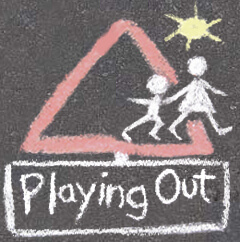10 good reasons for street play
Here is why we believe that playing out is a good thing for children:

1. Children need to play.
It is vital for their happiness, physical and emotional development and social learning. It is also a human right under the UN Convention on the Rights of the Child.
2. The street is a blank canvas.
An empty street might seem like a boring space for a child but in fact it allows for truly child-led, creative, imaginative free play, providing important benefits over structured, organised activities in designated spaces.
3. Children like to play near home and have traditionally done so.
The most accessible everyday space to a child – as long as it’s safe – is the one right outside their front door. A 2007 poll found that 71% of adults played out on their street every day compared to only 21% of children today (Playday).
4. Children need ample space to play energetically.
Play is the easiest and most natural way for children to get the exercise they need to be healthy – all they really need is easy access to safe space. Many homes do not have gardens and in cities these tend to be small. Children often can’t get to parks and other open spaces easily whereas the street (or estate space) is right there where they live.
5. Playing in the street increases community cohesion.
It brings neighbours of all ages together by providing a sense of common space and shared ownership. It can engender a sense of collective responsibility and thereby increase the safety of the neighbourhood.
6. Street play creates new opportunities for socialising and friendships.
These are often across age groups, or with children that go to other schools. Playing out also increases contact between children and adults, helping to build up familiarity and trust.
7. Children learn valuable skills and gain independence.
As well as gaining physical skills like cycling or skating, playing out gives children a chance to learn important social skills and gain understanding about the world around them. Through dealing with situations as they arise, they gain confidence and an ability to manage risk, leading to greater independence.
8 Playing in the street allows for ‘semi-supervised’ play.
Where playing out is safe and a normal part of the community, parents can get on with other things while allowing children to play outside together. Children are also far more likely to play outside every day if able to play near their home, rather than relying on parents to take them somewhere else, like the park.
9. The street is the “starting point for all journeys” (Tim Gill, 2007)
The ability to play independently in the street is a first step towards greater independent mobility around the neighbourhood – to visit friends, go to the park or walk to school.
10. Streets constitute the vast majority of public space in the city.
To see them only as places to drive and park cars is to massively undervalue them. Streets can and should be places where people can sit, talk, read, play and walk – and even sing and dance if they want to! The only way this will happen is if we start to use them differently.
Do you have worries around children playing out more, or around a play street happening where you live? Have a look at this list of possible concerns and our responses.
If you’d like to learn about play streets from people who have organised them, read this blog. Or if you want to read in more depth about the benefits of and barriers to playing out, you can explore the interesting research and articles we’ve collected.








